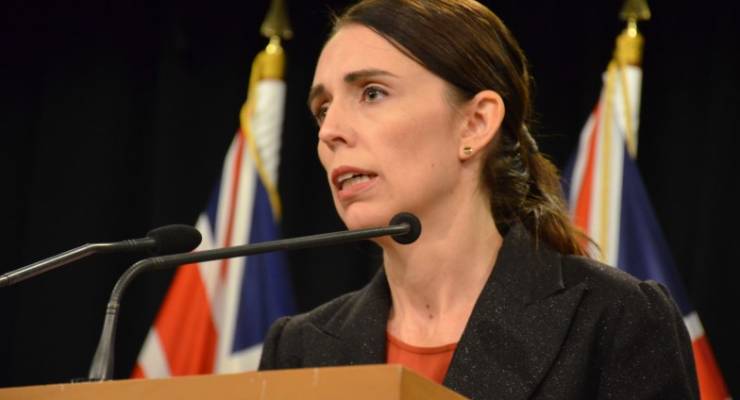
Trans-Tasman rivalry is normally restricted to either the sporting field or disputes about the origins of various (Kiwi) successes — from Phar Lap and the pavlova, to Russell Crowe and Neil Finn. Thanks to Jacinda Ardern and John Key, a new area of competition is emerging: politics, and more specifically prime ministers.
For eight years John Key, a seeming paragon of stability and levelheadedness, guided his country through the tribulations of the GFC and two major earthquakes. In the same period, Australia witnessed internecine war in both major parties and churned through five prime ministers. The contrast was captured best by Key himself when he quipped about meeting his Australian counterpart, “I don’t really mind who turns up; just wear a name badge so I know who it is”.
And now comes Jacinda Ardern. Even before the Christchurch terror attacks she had demonstrated her leadership skills by being the first world leader to attend the UN General Assembly with her baby and by being prepared to criticise China for its human rights abuses in spite of that country’s importance to New Zealand as a trading partner. Ardern’s triumphant handling of the Christchurch attack has now raised her profile to a whole new level. Less than a week after the attack, The New York Times published an editorial that was typical of the adulation she received: “America deserves a leader as good as Jacinda Ardern”.
Many Australians now have a bad case of PM envy.
However Australians were much grumpier about politics than their Kiwi cousins even before Ardern’s arrival on the prime ministerial scene, as evidenced by the Australian Election Study and the New Zealand Election Study. For the latest national election in each country — 2016 in Australia and 2017 in New Zealand — both surveys asked whether voting “matters”, and whether it “makes any difference to what happens”. 81% of the Kiwi respondents who expressed a view said that voting matters. The figure in the Australian survey was just 58%.
The surveys also asked respondents whether it “makes a difference who is in power”. Once again it was the New Zealanders who were more optimistic — 73% said it makes a difference, compared to only 55% of Australians.
Do these results mean that New Zealand has a better quality of politics or that Kiwis have lower standards? Many Australians might argue that the results simply prove New Zealanders are more gullible and naïve than their worldly Australian neighbours. That would be wishful thinking.
The attitudes and values of the two peoples are very similar. The marked disparity in the election surveys reflects instead the much more chaotic and dysfunctional politics on this side of the ditch. This is no mystery. Even Australian politicians acknowledge the problem. Shortly after winning a narrow victory in the 2016 election, Malcolm Turnbull admitted that there “is no doubt that there is a level of disillusionment with politics, with government and with the major parties”.
Polling undertaken since 2007 by the Scanlon Foundation has reflected this. There is a downward trajectory in the percentage of respondents who, when asked if “the government in Canberra can be trusted to do the right thing for the Australian people” reply “almost always” or “most of the time”. The figure was just 30% in 2018. The quality of government and politicians was ranked as the second most important problem facing Australia, as it has been in most of the Scanlon surveys.
Griffith University and Transparency International Australia carry out the Global Corruption Barometer which asks how much trust and confidence respondents have in the federal government doing “a good job in carrying out its responsibilities”. In 2008 about 20% replied “not very much” or “none at all”. By 2018 that figure had risen to more than 50%.
The message is clear — trust in politics and politicians is low and declining in Australia. An increasing number of Australians seem to subscribe to the view, expressed more than 50 years ago by Donald Horne in his 1964 book The Lucky Country, that Australia is a “lucky country run mainly by second-rate people who share its luck”.
As we rapidly approach the next federal election, we can only hope that there are some first-rate people on the horizon.
Ross Stitt is a lawyer and freelance writer. He tweets at @ross_stitt.








Hi – this would have been a great opportunity to give an analysis as to why Kiwis feel better represented and more satisfied than Aussies. Is it because of NZ’s system of Mixed Member Proportional representation? Or are the country’s party machines themselves more representative of the people, rather than a pack of middle-aged mediocrities who have never developed beyond their stupid SRC antics? Is it NZ’s system of political funding, the transparency of lobbyist activity, or the lack of a decades-long culture war fought by 3AW, 2GB, and all the creeps and weirdoes from News Corpse? Hopefully you’ll give us a part two, as we are already well aware that Australians wouldn’t tinkle on their politicians even if they were on fire.
Great points Pinko – I hope Ross responds.
If there is to be a leader to emerge to turn the trust levels back up, we can take a good guess at which side of politics it might be from, and which side has zero chance of throwing one up.
Agree, esp the MME, but your final point is highly apposite – most of our MPs do seem to be the result of a domestic pet “throwing one up“.
Agree pinkocommierat, that would be a great read. Speaking as a citizen of both countries, I think there are a number of factors. In NZ there is only one level of government which simplifies things a lot, and combined with the way MMP works, I think voters feel that their vote has a lot more direct impact on what actually happens. You vote for your preferred local MP and you express your party preference. Your choice of MP won’t necessarily end up in Parliament, but you can feel reasonably confident that the makeup of the national Parliament is representative of the overall will of the country, and then they more or less get on with the job (notwithstanding those occasions where we just leave it to Winston Peters to decide what happens!). In Australia the state and federal governments are often at odds with each other, and although the electoral system is still broadly representative, those random nutjobs who end up in Parliament through an arcane series of preference deals do tend to get a lot of media attention. Plus then there are factions and infighting and extremely powerful lobby groups, and in the end what actually gets done at a federal level feels very disconnected from what the average voter may have had in mind.
Also, Rupert Murdoch.
I hadn’t even considered NZ’s flatter government structure, f1p! I recall visiting a committee room on a tour of Parliament and the guide explained how members of the community can and do make submissions at various Parliamentary enquiries.
Naturally it’s not every submission that’s worth investigating further, but when they show up to give evidence at these enquiries, MPs get to drill them. The ability to do this is frankly empowering given the population’s circa 5 million. Compare this with the Australian experience, where you get a 22 year old ex-student-pollie-turned-phone-stooge when you try to deal with members of our House of Reps.
Not only does NZ have a flatter government structure…they also have no upper house, having abolished it in the 1950s. This means that, when you combine all the MPs at State and Federal level here, both upper and lower houses, you can see that while NZ has roughly 20% of our population, it only has about 3% of the total number of our MPs, so the talent pool of prospective intelligent MPs over there is spread nowhere near as thinly as it is over here. which helps explain some of our Senators.
“The message is clear — trust in politics and politicians is low and declining in Australia.”
“and declining” ! After many successive years of bad news, trust is still declining !
“we can only hope that there are some first-rate people on the horizon”. First rate people are no longer enough. We need to break the hold on candidates exercised by the party machines and the electoral laws they have fiddled. I can no longer vote for a candidate who has sold their soul to a party because it says they will sell anything else, too.
It’s not the party that has bought the soul that you need to worry about. It is the “donors”. NZ has almost no minerals and hence no MCA. I also wonder how much influence can be exerted by the “business lobby”, although it must be substantial. John Key led a conservative government and refused to implement a fiscal stimulus during the GFC period and NZ had to suffer the consequences (unnecessary hardship in my opinion). So neoliberalism is alive and well there and will take its toll in the years to come, unless Jacinda Ardern and party can see their way around it. If people in NZ are happy with things, it might just be because they are sufficiently deluded. Think of all the people who thought the Howard government was just wonderful.
I enjoyed this article and as pinkocommierat points out, there’s a lot more to dig into. One nitpick though – there are a lot of positive adjectives that could be used about Jacinda Ardern’s response to the Christchurch attack, but “triumphant” is really not a good one.
How many of the people whinging about the lack of civility and humanity in Australian politics get that big whine out and then go straight back to watching Channel 7 and reading the Daily Murdoch?
Fine, I’ll be the cynic- most leaders are super popular in the immediate aftermath of a national tragedy if they say the right things.
I thought Jacinda Ardern’s response was perfect in a way I find it unlikely that, say, Scott Morrison would have managed, but nevertheless- George W Bush was never so popular with Americans as after 9/11. Anna Bligh was never so popular with Queenslanders as after the Queensland floods. John Howard’s most popular moment in politics was probably his response to the Port Arthur Massacre. There are oodles of other examples.
Comparing Ardern’s popularity at this moment to any leader not coming off a national tragedy is a bit unfair.
Fair enough Arky, but getting past the popularity thingy you’ve glommed on to, her leadership has actually been inspirational in a way I couldn’t say about Bush, Howard or even Anna Bligh. It wasnt just a ‘woman’s touch’ either,although that explains some of it. She was actually, what’s that word, oh yeah, a leader.